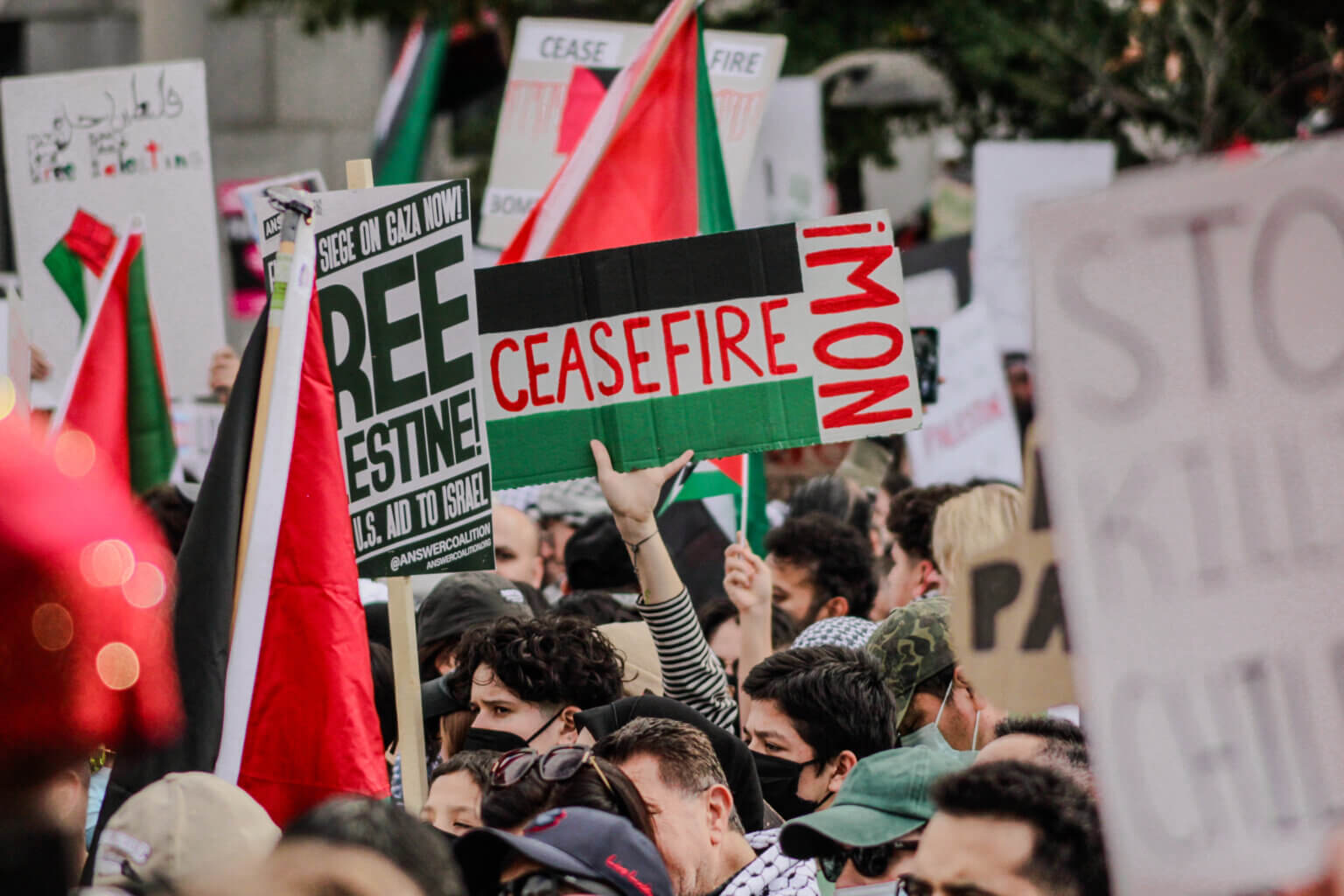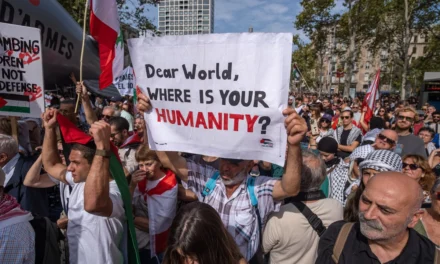WMJ Editor’s note: On March 21 Milwaukee County Board of Supervisors approved a resolution calling for an immediate and permanent cease-fire in Israel and Gaza, prioritizing the immediate release of hostages and the delivery of humanitarian aid, including a call for a cease-fire in the occupied West Bank.
NATIONAL MARCH ON WASHINGTON: FREE PALESTINE, HELD ON NOVEMBER 4, 2023. (PHOTO: MARCH ON WASHINGTON)
Last month, the Illinois village of Bolingbrook passed a resolution calling for an immediate and permanent ceasefire in Gaza, making it the first Chicago suburb to adopt such a measure.
In a statement posted to Facebook after the resolution passed, Village Trustee Michael Carpanzano cited the local organizing that led to the measure.
“On a personal note, I have fielded literally hundreds of interactions on this topic especially in the past three weeks — both digitally (email, text, etc.) and in-person,” Carpanzano wrote. “Varying opinions and various suggested action items were discussed. Some will be grateful for last night’s action, others will not be. But know your message was heard, your voice was heard, your sentiment was felt.”
Reem Townsend is a Palestinian-American elected official in DuPage Township (where Bolingbrook is located) and a core organizer on the ceasefire resolution. She detailed some of the local organizing that Carpanzano referenced.
“I organized a Bolingbrook Families for Ceasefire under the organization Families for Ceasefire, a group co-founded by a Jewish anti-Zionist friend of mine,” she told Mondoweiss. “From that action, and social media posts on it, people reached out and wanted to know what more they could do. And so myself and friends of mine started a grassroots movement of pro-Palestine ceasefire actions in the western suburbs.”
“The local mosque has a good relationship with the village and they rallied people to show up to a strategy meeting where we discussed the resolution and created a chat group where we could share action items and next steps,” she continued. “We rallied people to call, email, schedule meetings with the rest of the board to emphasize the importance of a ceasefire resolution. At the meeting, we encouraged everyone to attend and speak about amending the resolution to call for a permanent ceasefire in Gaza. It passed unanimously because of months of local community organizing. Those relationships grew into a strong force for justice, as almost 200 people packed the room to express their support for a permanent ceasefire now.”
Bolingbrook is certainly not an outlier. Since Israel began its assault on Gaza last October, we’ve seen ceasefire resolutions passed across cities small and large, from Belfast, Maine to Seattle.
The Building Movement Project (BMP) and Muslims for Just Futures maintain a tracker that focuses on resolutions passed by local and state institutions across the United States. As of March 19th, 107 ceasefire resolutions have passed and another 33 have been proposed.
Deepa Iyer is the Director of Strategic Initiatives at BMP.
“As we continue to see the U.S. veto UN ceasefire resolutions, local municipalities send the message that the will of the people is moving in a particular direction,” Iyer told Mondoweiss. “Across the board, this not an easy road. There’s a lot of deep community mobilization, a lot of educating legislators.”
Muslims for Just Futures Executive Director Darakshan Raja was on the forefront of one such road in Chicago, which became the largest city to pass a ceasefire resolution in January. The tie-breaking vote was cast by Mayor Brandon Johnson.
“We used an inside and outside strategy,” said Raja. “There was a lot of work by Chicago progressive staffers calling on local city government to pass the resolution. We got 167 organizations to endorse it. The movement was multi-faith, multiracial. Chicago has largest Palestinian community in the entire country and Palestinian organizing were a huge part of it.”
City resolutions are part of a much larger protest movement calling for a ceasefire and its momentum has presumably pushed some politicians to back one. Nonetheless, the number of congress members calling for an end to the Israeli bombing remains low. 77 Senators and House Representatives have embraced the call, which is less than 15% of congress. Despite some public hand wringing, there’s also been no indication that President Biden is on the verge of forcing a ceasefire or cutting off military aid to Israel over the bombing.
However, the administration has to adapt to the movement and anxiety over Gaza impacting the presidential election is undoubtedly growing within The White House. Earlier this month NBC News reported that Biden’s handlers “taking extraordinary steps to minimize disruptions” from Palestine protests.
NBC also reported that Biden began “seething” at a private meeting after learning of his declining poll numbers in Michigan and Georgia, where “uncommitted” electoral efforts targeted the president in the states’ Democratic primaries.
Activists say the organizing happening now will have a lasting impact beyond the current moment.
“I see more civic engagement as a result of this point of entry,” explained Iyer. “We’re seeing more interest from communities of color who want to run for office, more interest in BDS. Stronger coalitions are being built.”
“We are seeing people make the connections between Israel and U.S. militarism, the connections to divestment, the connections to the training of U.S. law enforcement by the IDF. The connection between the foreign and domestic,” said Raja. “We’re able to talk about the war on terror, dollars being taken away from communities. Palestine is going to be one of those core social justice issues.”
“There’s going to be a shift,” predicts Townsend. “Social media has woken people up to where our tax dollars are going. We’re going to keep track of people who have called for ceasefire vs. those who stayed silent. More and more people are focusing on this, they’re focusing on holding our leaders accountable.”
While few national lawmakers have embraced calls for a ceasefire, polls show that there’s firm support for one among the U.S. public. A February Data for Progress poll found that 67% of likely U.S. voters support a ceasefire, including 77% of Democrats.
“People understand that the resolution is a baseline,” says Raja. “It’s not going to stop the genocide, but it’s helping to turn street power into political power.”
Michael Arria
Michael Arria is the U.S. correspondent for Mondoweiss. His work has appeared in In These Times, The Appeal, and Truthout. He is the author of Medium Blue: The Politics of MSNBC. Follow him on Twitter at @michaelarria.














